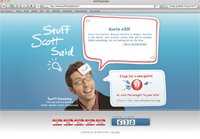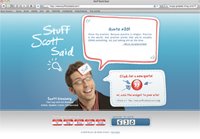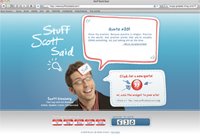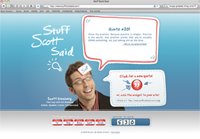 Email spam – while annoying, unethical, sexually graphic and a colossal time waster – IS quite entertaining.
Email spam – while annoying, unethical, sexually graphic and a colossal time waster – IS quite entertaining.
It’s also a consummate example of smart marketing.
Recently, I spent some time perusing the 1,385 messages in my spam folder.
Not surprisingly, patterns began to arise.
I extracted a collection of subject lines and headers that either grabbed my attention, made me laugh, or caused my body to react in ANY kind of way. After all, emotion is the final arbiter of truth. And your body never lies to you.
TODAY’S CHALLENGE: As you read each of these subject lines, set aside your distaste for spam. Forget about the fact that you (probably) don’t need Viagra.
Turn on your marketing brain to learn eight more powerful lessons (read the first eight lessons here!) from the masters of capturing attention and piquing curiosity:
1. Help her blast off with your meat rocket. Out of the sixteen examples on this list, “meat rocket” is one of my faves. Sure, it’s raunchy. And by no means should your marketing reflect such adolescent verbiage.
But you HAVE appreciate the sheer poetry of this headline. Not to mention, it’s hilarious. Plus, what guy wouldn’t want his girlfriend to experience the sexual ecstasy of Apollo 13? Well done.
SPAM SECRET: People want sex. How are you helping them get more of it?
2. I haven’t heard from you. Ah ha! More cognitive dissonance for people who place high value on approachability. Now, admittedly, this headline has tricked me several times over the years. I’ve even clicked through once or twice, only to find myself at a website that gave my computer a virus. Dang it.
I blame my inability to experience myself as being an unapproachable, distant jerk. The other half is, I’ve actually received REAL emails from REAL people using this very headline. It hurts.
SPAM SECRET: People don’t like being perceived negatively. How can you tempt them?
3. Maintain your weight – amputate. Holy Slim Fast. This is, by far, the most absurd, disgusting and embarrassing thing I’ve ever read in an email. Which is exactly why it caught my attention. Now, I’m not suggesting you start telling customers that self-mutilation is the secret to success.
Your challenge is to think about what this headline says about our culture. Yes, it’s ludicrous. Yes, it’s disgusting. But would it (honestly) surprise you if you turned on CNN and the top headline was, “Man amputates leg to lose weight”? Wouldn’t shock me. People will do ANYTHING to lose weight, especially if the strategy requires no work other than locating the chainsaw. Eew.
SPAM SECRET: People want to be thin. Are you helping them get there quicker?
4. That with stirs of feet and wings. This headline sounded so poetic, I just had to google it. Sure enough, that line comes from a poem called The Kitten and Falling Leaves by William Wadsworth.
Too bad the email tried to subscribe me to an online gambling site. Jerks.
SPAM SECRET: Wadsworth was a genius. Are your words that strong?
5. Make her shout like an alarm. Excellent use of simile. Paints a vivid picture. Plus, this headline puts the company’s product in the customer’s future by describing the benefit of the benefit of the benefit. Well done. The only way to improve this headline would be to make a comment about waking up the neighbors. That’s the ultimate.
(Oh, don’t act like you’ve never been on SOME end of that situation before).
I don’t care if you’re male or female, straight or gay, passion is passion. And there’s nothing more gratifying than when the stunningly beautiful Brazilian model that lives in the unit below you knocks on the door one day to shyly tell you that you and your girlfriend should try to, ahem, “keep it down” at night. Hypothetically.
SPAM SECRET: People want sex. Did you forget that already?
6. Your friend, Peter, thought that you would be interested in this album. First, the headline uses a common name. Most people probably have a friend named Peter. Second, the headline implies that Peter took the time out of his busy schedule to recommend a record JUST for you.
Wow. Good ol’ Pete. What a guy. And you wouldn’t want his precious time to go to waste, now would you? Finally, let’s say you delete the email. Then, three weeks later, you run into Peter and his wife at McDonald’s.
“Hey Scott! Long time no see! Say, how’s that album I recommended to you a few weeks back? Did you listen to it? Wasn’t it great? That was the debut LP of my wife’s new band, Death by Marshmallow. They’re huge in Bulgaria!”
Woops. Sorry Pete. Tell your wife I’ll come out to their next show. Just let me go find my passport…
SPAM SECRET: People like recommendations. Did you know that’s how Amazon makes billions?
7. Wrong. Unbelievably powerful. ONE word and I was hooked. Wrong. And the cool part is, this headline appeals to various personalities. First, if you’re the type of person who always has to be right, your ego will be triggered immediately. And you’ll go to the end of the earth to prove that you were NOT wrong.
Or, if you’re like me and enjoy being wrong to stimulate learning opportunities, this headline would entice you to open the letter immediately and excitedly discover where you screwed up.
SPAM SECRET: People cherish their egos. Are you speaking to them?
8. You didn’t even think about it. I saved this one for last. Personally, I think it’s the most powerful, most effective and most emotional headline on the list. First, by using the past tense, it forces the reader to immediately begin traveling back in time, questioning her own reflection abilities. Wait a minute – was there something I should have been contemplating that I forgot? Oh no!
Second, the word “even.” As if something as simple and effortless like “thinking” was the minimum requirement, and you couldn’t even satisfy that. Jeez. Way to be an insensitive jerk.
Lastly, I admit that I’ve been guilty of this mistake before. Hey, I’m not perfect. I get lazy. And I’ve had people (whom I LOVE) confront me in person, via email or over the phone and say, “You didn’t even think about.”
It hurts. Badly. Cuts deep down the core. So, while effective marketing (shouldn’t have to) resort to making customers feel like wretched human beings, your challenge is to pinpoint the self-interest of the people you serve, and speak to it.
SPAM SECRET: People don’t like being jerks. Are you calling them out?
Now that you’ve been schooled in the ways of spam, here’s your final exercise.
1. Take five minutes to peruse your spam folder. You might want to do this at home so your boss doesn’t look over your shoulder and wonder why you’re reading emails about “meat rockets.”
2. Record your reactions. Any time a subject headline makes you smile, laugh, roll your eyes or become nauseated, write it down.
3. Extract the lessons. Look for commonalities among all the headlines. Democratize and genericize the centrals marketing themes. Then, write out a list of “spam secrets.”
4. Apply. Execute those strategies in your own marketing practices in an ethical, professional manner.
REMEMBER: This is the best way to help her blast off with your meat rocket.
Hee hee. Meat rocket.
LET ME ASK YA THIS…
Are you as savvy as the spammers?
LET ME SUGGEST THIS…
For the list called, “88 Questions Every Marketer Should Ask,” send an email to me, and you win the list for free!
* * * *
Scott Ginsberg
That Guy with the Nametag
Author, Speaker, Entrepreneur, Mentor
[email protected]
 Who’s quoting YOU?
Who’s quoting YOU?
Check out Scott’s Online Quotation Database for a bite-sized education on branding success!

 1. Ambiguity is opportunity in disguise. Love it. Welcome it. Embrace it. And know that NOT knowing paves the way for glorious and unimpeded progress. How do you act when faced with ambiguous situations?
1. Ambiguity is opportunity in disguise. Love it. Welcome it. Embrace it. And know that NOT knowing paves the way for glorious and unimpeded progress. How do you act when faced with ambiguous situations? Who’s quoting YOU?
Who’s quoting YOU? PICTURE THIS: You just watched somebody give a speech.
PICTURE THIS: You just watched somebody give a speech.  Who’s quoting YOU?
Who’s quoting YOU? Today is day 3,367 of wearing a nametag 24-7.
Today is day 3,367 of wearing a nametag 24-7. Who’s quoting YOU?
Who’s quoting YOU? 1. Do as I say AND as I do. Life your life of zero distinction between the two. Where the message you’re preaching is the dominant reality of your life. Where your footsteps are in line with your mouthsteps. And where your onstage performance is congruent with your backstage reality. In what areas of your life are you forgetting to partner with integrity?
1. Do as I say AND as I do. Life your life of zero distinction between the two. Where the message you’re preaching is the dominant reality of your life. Where your footsteps are in line with your mouthsteps. And where your onstage performance is congruent with your backstage reality. In what areas of your life are you forgetting to partner with integrity? Who’s quoting YOU?
Who’s quoting YOU? 1. Writing is blood in disguise. Sit down, slice open a vein a bleed your truth all over the page. That’s my official definition of writing. And after publishing ten books and a thousand articles, here’s what I’ve discovered: Writing in blood is a huge time saver.
1. Writing is blood in disguise. Sit down, slice open a vein a bleed your truth all over the page. That’s my official definition of writing. And after publishing ten books and a thousand articles, here’s what I’ve discovered: Writing in blood is a huge time saver.  Who’s quoting YOU?
Who’s quoting YOU? Email spam – while annoying, unethical, sexually graphic and a colossal time waster – IS quite entertaining.
Email spam – while annoying, unethical, sexually graphic and a colossal time waster – IS quite entertaining. Who’s quoting YOU?
Who’s quoting YOU? I was eating sushi when it happened.
I was eating sushi when it happened. Who’s quoting YOU?
Who’s quoting YOU?